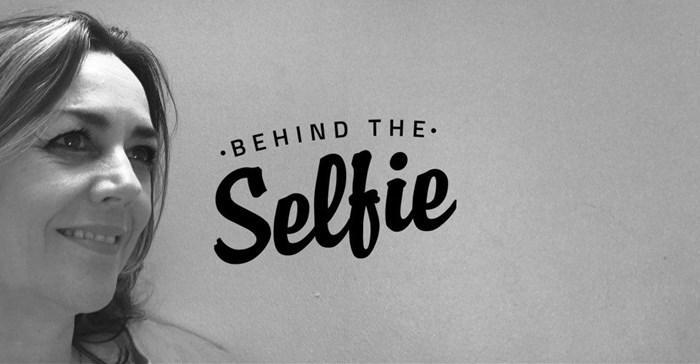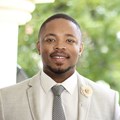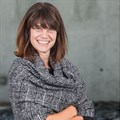#BehindtheSelfie with... Gillian Rightford

1. Where do you live, work and play?
Live: Cape Town.
Work: Wherever I'm needed – Cape Town, Jo’burg, Durban, Windhoek, Nairobi, Cairo, Amsterdam, Boston.
Play? Anywhere.
2. What’s your claim to fame?
Am I famous yet? I like to think I’m famous for being a champion for the role creativity plays in unlocking business growth. I’m probably famous for rolling my eyes at Trump on Twitter.
Actually, a lot of people thank me for the articles I post on social media regarding marketing and advertising and for being a loud advocate for creativity in the industry, so maybe I’m famous for that.I was once called a thought leader – that was nice. I was also called a combination between an agony aunt and a freedom fighter, and I liked that a lot.
3. Describe your career so far.
I started off, after doing a business science honours degree in marketing, working in marketing strategy consulting. I loved it, although I felt I needed more business and life experience before I could be a good consultant. Mostly, I really wanted to work in a house with cats.
I met Nick Rawden, who ran a small design and below-the-line agency (in a house with cats), which was fairly strategic in its projects – so I took the job. Whilst there, I met Graham Warsop and Dennis Hoines and was with them as we brainstormed the name for The Jupiter Drawing Room (Graham won the naming competition).
I then went to try and work overseas, came back and worked for SBBW – learning how to do 'above the line'. And then an opportunity presented itself to pitch for a new piece of business – it was M-Tel, the service provider for MTN at the time. So I approached Graham and Nick and we pitched as a yet-to-be-formed company – Hercules (son of Jupiter) – and won the business.
It was 1994. It was the ‘switch on’ of the cellular industry, it was the dawn of the new South Africa, and we had a brand new agency. We became the South African affiliate of international agency D’Arcy Masius Benton & Bowles (DMB&B – remember them?), and in no time were flooded with global clients coming back to SA – P&G, Philips, Fiat & Alfa Romeo, Western Union, Hush Puppies.We had a brilliant team and did brilliant work – in fact, many of the giants in the industry today started off as juniors with us. We had an incredibly talented team. We had a blast. Sadly, after seven years, DMB&B merged us with another company, which went pear-shaped from the start. I was approached by Matthew Bull to see if I wanted to run the Johannesburg office of Lowe Lintas Bull Calvert Pace. I said yes.
So I ran the Johannesburg office – it was a wild and challenging time – we had to turn a very big and dusty old ship around into a creative agency, and we did just that with a new team and the support of our biggest clients: we won our first Cannes Grand Prix awards in six months from taking over. I ran Lowe Bull Johannesburg for three years and then took over the running of the group in 2003.
In 2007, I left the group and started my own consultancy called Adtherapy. I also started lecturing at the University of Cape Town, where I still lecture a course in Integrated Marketing Communication – part of the post-graduate Diploma in Marketing Management.
The main focus of Adtherapy is unlocking better creative output and business results for marketers and agencies. How do I do that? Through a combination of consulting and training. I run partnership alignment programmes, which attempt to get to the bottom of relationships that aren’t working – I consult strategically on creative and communications issues – I consult on agency structure and process issues.
I run training programmes for clients and agencies – Creative Fitness is the one most in demand – on how to brief, how to evaluate, how to give feedback.
I also run the Business Marketing Academy, which sets up in-house academies for corporates – I develop curricula and source and develop the right modules for them. I’m honoured that some of the very best practitioners in SA have designed modules with me, for my clients.
4. Tell us a few of your favourite things.
The bush. Flyfishing. Photography. My family. My friends.
5. What do you love about your industry?
I love the sense of humour, the quick wit. One thing you realise when you work outside the industry is that most people don’t laugh as much as we do.
6. Describe your average workday, if such a thing exists.
I start work at 9am, and end at 6pm-ish. In a day I could be strategising, researching, lecturing, writing plans or proposals, interviewing people for an intervention project, developing or delivering a workshop, lecturing, writing a blog or social media posts, planning my next big thing, looking for new business, doing admin, or, usually, all of the above.
7. What are the tools of your trade?
My MacBook, my phone and a Moleskin.
8. Who is getting it right in your industry?
The hard part of my job is that I sit at the intersection of three industries – advertising, marketing and education.
I think someone like Mark Ritson gets it right in terms of calling BS on many in the marketing industry, advocating going back to basics and getting those right before chasing new shiny things.
I admire King James for their ability to do great work on brands and categories where great work was thought to be impossible.
Education? GetSmarter has fulfilled a need to upskill quickly and they’ve done it cleverly. I like where the Red & Yellow School is going. The ultimate seems to be the Berlin School of Creative Leadership. Maybe I’ll go there, one of these days.
9. List a few pain points the industry can improve on.
The number one area is really understanding what works and why it works. Strategic thinking is reduced to a person: is Strategy in the meeting, has Strategy seen that? Instead, it should be infused through every interaction and request from the client.
Marketers are not that well versed with what works either, and yet often their requests are simply complied with instead of really getting down to what’s the main issue communication can solve, what will move the needle for the business.
Skills across the board are a big issue, the biggest being the quality of client and internal creative briefs, which leads on from my strategy point above.
The brief is both a strategic document and the starting point of the creative process – get that wrong and you are doomed. Very often, the creative team are the best strategic thinkers and yet they are not involved in the business challenge often enough. Agencies need to probe, question, diagnose – not simply execute.
Remuneration is a bugbear too – but honestly – agencies could be so much more efficient, clients could save time and money, and both could do better quality work, that would work better – if more people were more skilled through the process.
10. What are you working on right now?
I’m developing a new offering called Brief Therapy, consider this the worldwide launch! It will allow marketers and agencies to get live coaching on their briefs, from a panel of briefing whizzes.
I’m developing next year’s curricula for two in-house marketing academies.
So much on the go!
11. Tell us some of the buzzwords floating around in your industry at the moment, and some of the catchphrases you utter yourself.
Content. Insights. Millennials. AI. VR. Digital-first. Mobile-first. All the shiny toys. Chief growth officer. #Anything-hack. Purpose. Influencers. Future-proofing.
I do bang on about insights because they are so important. I use the phrase ‘next steps’ too much.
12. Where and when do you have your best ideas?
Usually at 3 in the morning, when I can’t sleep.
13. What’s your secret talent/party trick?
I’m a reasonably good writer.
14. Are you a technophobe or a technophile?
I love technology – definitely a techno junkie.
15. What would we find if we scrolled through your phone?
A LOT of apps. Thousands of photos.
16. What advice would you give to newbies hoping to crack into the industry?
Know the basics. Read the Advertising Code. Understand the basics of marketing strategy. Ask questions. Ask the right questions. Ask why – a lot.
Simple as that. Follow Rightford on Twitter, LinkedIn and Instagram, as well as AdTherapy on Twitter. Also click here for more on the IMC Conference, taking place on 14 March 2019 at Fox Junction, Newtown. Follow the IMC Conference on LinkedIn, Twitter, Facebook and Instagram for the latest updates.
*Interviewed by Leigh Andrews.





































